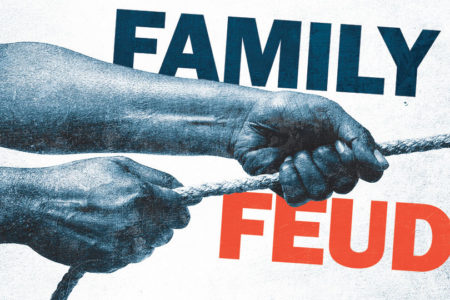Troubled Twins
From birth to blessing, trouble defined the relationship between Jacob and Esau.
Listen to Chris Katulka’s interview with Peter Colón about this article (begins @ 13:30).
“Is he not rightly named Jacob? For he has supplanted me these two times. He took away my birthright, and now look, he has taken away my blessing!” Esau said (Gen. 27:36).
Struggle defined Jacob and Esau’s relationship. It began in the womb (25:21–26), continued when Esau sold his birthright to Jacob (vv. 29–34), and culminated when Jacob stole Esau’s blessing (27:1—28:5). Though they were twins, the men were as different as night and day, and they became the fathers of very different nations.
In the womb they struggled so much their mother, Rebekah, asked, “If all is well, why am I like this?” (25:22). Perplexed, Rebekah prayed to God for an answer.
The Lord told her, “Two nations are in your womb, two peoples shall be separated from your body; one people shall be stronger than the other, and the older shall serve the younger” (v. 23).
To their credit, Isaac and Rebekah did what faith requires during difficult times: They sought the Lord—Rebekah during her difficult pregnancy and her husband on her behalf when she was barren (v. 21). In faith, they did as the psalmist had: “In my distress I called upon the Lord, and cried out to my God; He heard my voice from His temple, and my cry came before Him, even to His ears” (Ps. 18:6).
The Lord heard their cries, and Rebekah gave birth to Jacob and Esau:
So when her days were fulfilled for her to give birth, indeed there were twins in her womb. And the first came out red. He was like a hairy garment all over; so they called his name Esau. Afterward his brother came out, and his hand took hold of Esau’s heel; so his name was called Jacob. Isaac was sixty years old when she bore them (Gen. 25:24–26).
Esau means “hairy one.” An ancient Jewish commentary exaggerates Esau’s appearance, claiming he was born with hair on his head, a beard, and even hair between his teeth. Scripture, however, says Esau came out “red.” Red is a Hebrew wordplay for the name Edom, and hairy is a Hebrew wordplay for the word Seir.
Together, the words refer to the reddish-brown mountainous region stretching between the Dead Sea and the Gulf of Aqaba. Esau settled in Seir; and his descendants, the Edomites, later occupied that area (Dt. 2:4, 22). The book of Obadiah prophesies the nation of Edom’s doom.
The name Jacob comes from a Hebrew root word meaning “to supplant,” similar to a Hebrew word meaning “heel.” By grasping Esau’s heel at birth, Jacob tried to supersede the position of firstborn and thus acquired the nickname “heel-holder.” In this conflict, Esau won because he emerged first. However, God calls Jacob’s descendants the “apple of His eye” (Zech. 2:8) and promises them land, seed, and blessing via the Abrahamic Covenant.
Trouble Over the Birthright
As the boys grew, Esau became a skillful hunter, “a man of the field; but Jacob was a mild man, dwelling in tents. And Isaac loved Esau because he ate of his game, but Rebekah loved Jacob” (Gen. 25:27–28).
Jacob and Esau were complete opposites. Isaac favored Esau because of his hunting skills; and Rebekah favored Jacob, who was the more passive and spiritual of the two. Some people even try to depict him as a “mama’s boy.”
One day, exhausted and starving, Esau returned from the field to find Jacob cooking red stew (lentils). Esau literally demanded, “Let me gulp it down!” Jacob took advantage of his brother’s hunger by demanding Esau sell his birthright for the food (vv. 29–33).
THE PROMISE SERIES
Discover the rich history of Israel and the blessed guarantee of the Abrahamic Covenant in The Promise Series DVD.
A birthright made one the chief of the tribe and head of the family (27:29). In this family, the birthright determined who would inherit the Abrahamic Covenant. Jacob should not have exploited Esau’s weakness, particularly because he must have known that God had already decreed, “the older shall serve the younger” (25:23).
However, the sale of the birthright was legitimate. Esau freely chose to sell it, showing he “despised” it (v. 34). Scripture makes it clear that Esau sold his birthright because he was immoral and irreligious (Heb. 12:16).
Trouble Over the Blessing
When Isaac was old and growing blind, he asked his favorite son, Esau, to hunt wild game and prepare a meal for him. Isaac told Esau he would then give him the blessing due the firstborn (Gen. 27:1–4). Many years later under the Mosaic Law, a father was obliged to acknowledge his firstborn son as his principal heir and grant him a double portion of the estate (Dt. 21:15–17).
Rebekah overheard Isaac’s conversation with Esau and devised a plot to trick Isaac into blessing Jacob instead. When Esau returned, Isaac realized he had been deceived and trembled uncontrollably. Esau mourned, raged, and swore to kill his brother after their father’s death. So Jacob fled for his life and became an exile in a hostile world.
Many were at fault for this turn of events: Isaac failed to obey God, Rebekah resorted to trickery, Esau was profane, and Jacob distrusted God to work on his behalf. Sin has consequences: Jacob would later be deceived by his father-in-law as he had deceived his father (see Genesis 29—31). Galatians 6:7 says, “Do not be deceived, God is not mocked; for whatever a man sows, that he will also reap.”
After nearly 20 years apart, Jacob returned home and had to face his brother. The night before the meeting, he anxiously stood alone by the Jabbok River. An angelic man met him there, and Jacob wrestled with him until daybreak (Gen. 32:22–31). The man put Jacob’s hip out of joint and renamed him Israel.
The name Israel in this context literally means “Prince with God.” The “man” was the preincarnate Messiah Jesus, who is referred to in the Old Testament as “the Angel of the Lord” (cf. Ex. 3:1–6). Jacob named the place Peniel, which means “Face of God.” “For I have seen God face to face,” he said, “and my life is preserved” (Gen. 32:30). Jacob had received his father Isaac’s blessing through deceit, but he obtained God the Father’s blessing rightfully (v. 29).
Jacob learned the hard way to trust and depend on God. Some have said that when the Lord touched Jacob’s hip, he became a broken man and a new man at the same moment. Over the course of his life, he developed a strong, worshipful faith in God. Hebrews 11:21 says, “By faith Jacob, when he was dying, blessed each of the sons of Joseph, and worshiped, leaning on the top of his staff.”
The limp Jacob received from wrestling with the Lord probably caused him to lean on a staff to walk for the rest of his life—a great reminder for him (and for us) to “Trust in the Lord with all your heart, and lean not on your own understanding; in all your ways acknowledge Him, and He shall direct your
paths” (Prov. 3:5–6).









I Like the fact that Jacob means to follow hard after , maranatha